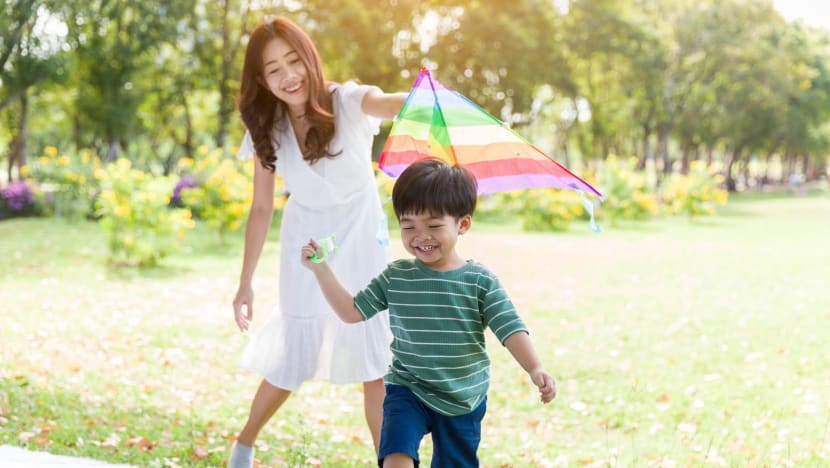Commentary: Why I choose not to be a ‘helicopter’ parent
Much of parenting is about gradually handing over the reins so our children grow in confidence to handle life’s challenges, says mum writer June Yong.

File photo. The more independent a child is, the more they tend to grow in responsibility as well. (Photo: iStock/Amorn Suriyan)

This audio is generated by an AI tool.
SINGAPORE: My eldest child attended the Outward Bound Singapore (OBS) camp last month. For most of the weekend prior to the five-day camp, she meticulously placed her toiletries into one bag, and split her daily clothes into individual resealable bags, as per her school’s instructions.
The thought of checking her bags to make sure she had enough socks or hadn’t forgotten to pack her toothbrush crossed my mind, but I resisted the urge to be a helicopter parent. I trusted her to handle her belongings responsibly. Even if she missed something, it wouldn't have been a big deal, and it would have been a learning experience for her.
The life skill of responsibility grows hand-in-hand with independence. The more independent a child is - whether it’s in packing their school bag or doing their homework without us nagging - the more they tend to grow in responsibility as well.
As Education Minister Chan Chun Sing said in a media interview earlier this year, many parents today are highly educated and more involved in their children’s lives, but they need to find a delicate balance between being overly controlling and being completely hands-off. Children, he said, need space to grow and learn independence.
So, how do parents navigate that delicate balance?
Mastery of this does not develop overnight, and for good reason too. Give away control too much, too soon, and you can end up with chaos. This can be seen clearly in the example of mobile phone use - any child who’s barely eight or nine years old would struggle to regulate their usage of a device that promises exciting rewards on every app they click.
But hold onto the reins too tightly and you may end up with a child who’s overly reliant and less adept at planning for themselves. Stories about college students who still depend on mum or dad to swoop in to rescue them when they cannot cope with deadlines or other responsibilities come to mind.
THE BACK-AND-FORTH DANCE OF CONTROL
In his book Building Resilience in Children and Teens: Giving Kids Roots and Wings, paediatrician Dr Kenneth Ginsburg identifies seven "C's" - competence, confidence, connection, character, contribution, coping, and control - as essential ingredients young people need to bounce back from life's challenges.
People who are resilient have an internal locus of control. When things go wrong in life, they don’t blame other people or their circumstances; they simply look at the resources available to them and recover as best they can.
We need to recognise that our parenting style is closely related to the development of independence and resilience. When our children are young, they need close supervision and guidance. For example, when crossing the road, you can often hear parents walking their children through traffic light rules and safety protocols.
When they reach school-going age, we teach them how to pack their bags and wallets for the next day, set their alarm clocks every night, and fold their clothes.
As they enter the second decade of life, and more significantly at the secondary school mark, much of parenting is about gradually handing over the reins so our teenagers grow in confidence to handle life’s challenges.
This process resembles a dance. As we take one step back for them to move one step forward, whether it’s fixing their own breakfast or tying their shoelaces, they pick up one new skill.
If they trip while taking that step forward, it may signal they may not be ready to do it fully on their own. Or maybe they simply need some support, such as a phone alarm reminder to head downstairs for tuition every Thursday.
HANDING OVER THE REINS
A large part of navigating this dance is about us parents learning to let go, and allowing our children to make mistakes.
For example, when my kids started to take the bus on their own during primary three or four, I went with them twice at the beginning, pointing out landmarks that would help them find their way home. We also talked through common scenarios such as what to do if they missed their stop.
The first time they missed their stop, it was slightly unnerving (not just for them but for me too!) but they managed to backtrack their way home.
Sure, as parents, we will have our fears and worries the first few times we let the kite strings loose. A thousand what-ifs will flood our minds - what if my child meets with danger, what if they fall into bad company, or what if from hereon they no longer want me to be around all the time?
The uncertainty and fear of not being needed is something that we parents fear. But in the face of that fear, shouldn’t we also see the beauty and purpose of raising a young person who can take ownership over their own lives, and be willing to practise making their own decisions and taking responsibility for them, as scary as that can sometimes be?
SAFE BOUNDARIES FOR FAILING
My middle child started secondary school this year. While I am a part of the parents’ group chat of his class, there are plenty of messages that I choose not to act upon - for example, when the next weighted assessments are.
It’s a conscious decision to allow my child, who’s been practising to take ownership of his own schoolwork and learning since the early years of primary school, to put his skills to the test.
And if he does fail an assessment, what’s the worst that could happen? The lesson from that small failure would be worth its weight in gold.
In Daniel Pink’s book Drive, which looks at human motivation, Pink argues that there are three things that fulfil us - autonomy, mastery, and purpose. In other words, being self-directed, improving our skills, and being part of something bigger than ourselves all work to build in us a sense of satisfaction and wellbeing.
I may have started off this dance with two left feet, and I am also soberly aware that the kids will grow into adults and not need their mum anymore (well, hopefully, at least, if I’ve done my parenting job right).
But I hope they’d still want to involve me in their lives - whether as babysitter to their kids or in other small ways. By then, my nest may be empty, but my heart would be full, as I quietly cheer my children on from the sidelines.
June Yong is the Lead of Programmes at Focus on the Family Singapore.




















